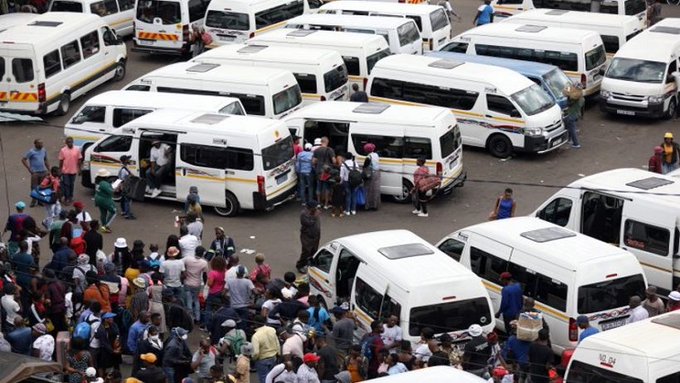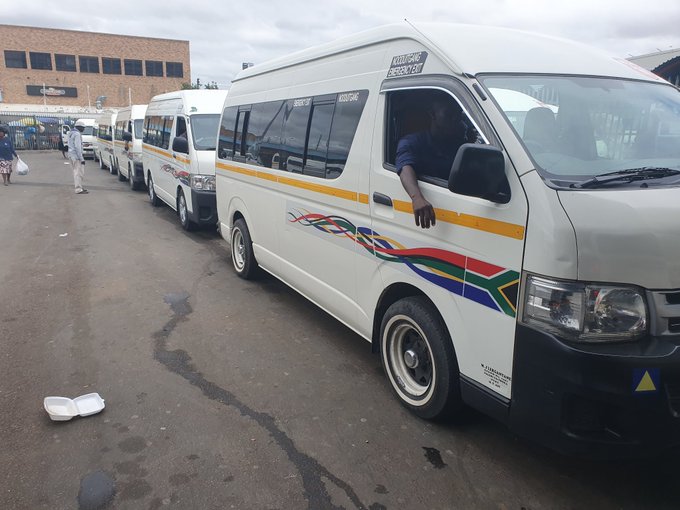
KZN government concerned ongoing long-distance taxi strike may dent provincial economy! The KwaZulu-Natal (KZN) government has expressed concerns about the adverse effects of the ongoing long-distance taxi strike on the provincial economy.
The strike, led by operators from the Durban Long Distance Taxi Association, has disrupted transportation and economic activities across the region.
The protest stems from grievances over the impoundment of taxis operating without the required permits. In response, striking operators have caused significant disruptions, including blocking major roads in Durban and demanding the immediate release of their vehicles.
Stalemate Over Permit Disputes
The Department of Transport has maintained its stance on the issue, stating that it is merely enforcing existing laws. Department officials revealed that there is a backlog of uncollected permits that operators refuse to retrieve.

A department representative commented, “The impounded vehicles were found operating without permits, which is a violation of transportation regulations. We have repeatedly urged operators to collect their permits, yet many have not complied. Until they do so, we cannot authorize the release of impounded vehicles.”
The department further clarified that taxi operators seeking to reclaim their vehicles must follow the legal process, which includes approaching the courts and paying applicable fines.
Disruptions and Economic Concerns
The strike has already caused widespread disruptions, with blocked roads in and around Durban creating chaos for commuters and businesses. Long-distance taxi operators, many of whom are refusing to operate until their demands are met, have left passengers stranded and dependent on alternative, often more expensive, transport options.
The KwaZulu-Natal Transport Committee has called for urgent intervention to resolve the stalemate. Committee chairperson Mncedisi Maphisa warned of the strike’s potential to harm the province’s economic prospects.
“This protest is not just an inconvenience; it is a threat to our provincial economy. Investors are watching this situation unfold, and such instability could discourage them from committing to KZN,” Maphisa said.

Calls for Premier Intervention
With tensions escalating, the Transport Committee has urged KZN Premier Thamsanqa Ntuli to intervene and mediate between the striking operators and the Department of Transport. The committee believes that a lack of decisive leadership could prolong the strike, leading to further economic and social disruptions.
Transport officials reiterated their commitment to maintaining the rule of law but acknowledged the need for dialogue. “While we cannot compromise on regulations, we are open to engaging with taxi associations to find a sustainable resolution that benefits all parties,” an official stated.
Stubborn Operators Dig In
Despite appeals for dialogue, many taxi operators have vowed to continue their strike until their demands are met. Speaking to the media, a representative of the Durban Long Distance Taxi Association accused the government of targeting their operations unfairly.
“We believe the impoundments are unjust and are simply an attempt to undermine our livelihoods. We will not back down until the government listens to us and releases our vehicles,” the representative said.
Operators also claim that the permit application process is inefficient and riddled with bureaucratic delays, making it difficult for them to comply with regulations.
Broader Implications
The strike highlights ongoing challenges in South Africa’s transportation sector, including regulatory compliance, infrastructure constraints, and strained relations between authorities and operators.
Transportation is a critical economic driver in KwaZulu-Natal, particularly given the province’s status as a hub for trade and tourism. Extended disruptions in the taxi industry could have ripple effects, affecting sectors ranging from retail to logistics.
Local businesses have already reported declines in sales due to reduced customer footfall, while workers who rely on taxis for their daily commutes are struggling to reach their workplaces.

Looking Ahead
The KZN government now faces the difficult task of balancing enforcement of transportation regulations with addressing the grievances of taxi operators. The outcome of this dispute will not only determine the immediate future of the long-distance taxi industry in the region but could also set a precedent for handling similar disputes nationwide.
As the strike continues, the spotlight is on Premier Ntuli and the provincial government to resolve the impasse. The broader public hopes for a swift and fair resolution that restores stability to KwaZulu-Natal’s transportation network and economy.
In the meantime, commuters and businesses continue to bear the brunt of the disruptions, while questions linger about the effectiveness of the regulatory framework governing South Africa’s critical taxi sector.
#KZN #government #concerned #ongoing #longdistance #taxi #strike #dent #provincial #economy



